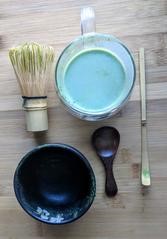I’ve been wanting to really try matcha for awhile now. I’ve had it before but I don’t think I really paid attention to what it was, how to prepare it, it’s benefits etc. From what I’ve gathered about matcha, it’s green tea but it’s the entire green tea leaf that has been powdered. So you’re getting all the nutrients from the tea leaf not just those that you get from brewing tea leaves. The name “elixir for immortals” seems fitting. In Japanese “cha” means tea and “ma” means powder so matcha means green tea powder. So this all makes sense from the name.

Brief matcha history
A bit about the history of matcha. It seems it was thought that the cultivation of green tea started sometime in the 7-10th century during the Tang Dynasty in China. It seems the teas was first prepared by roasting and pulverizing it. Then decocting it, that is extracting the essence by heating and boiling the tea. This process then evolved until grinding the steamed tea became popular in the 10-13th century during the Song Dynasty. In the 12th century this idea of making powdered tea from steam prepared dried tea leaves became popular. This preparing and consumption of powdered tea turned into a ritual by Zen Buddhists. These Zen Buddhists cultivated a green tea plant called Sencha which evolved into what is known as tencha. This was done by growing it under shady conditions, maximizing the therapeutic benefits of the green tea and then became known as matcha. There were meditational that were noticed, such as a greater sense of clarity and well being. They found drinking the matcha made them feel more centered, focused and maintain a higher level of energy throughout the rest of the day. This matcha tea eventually became know as the ceremonial tea of the temple high priests. Shogun warriors saw benefits of the tea. It is said that the monk Eisai brought Zen Buddhism and matcha to Japan in 1191.
It seems that originally matcha was very precious and produced in small quantities so that only nobility and shogun were able to drink it. However, in 1738 someone named Sohen Nagatani invented the uji green tea processing method. Another blog article, perhaps? This allowed for a more efficient process to create matcha. Now it was readily accessible to the general population and more people starting consuming matcha. Prior to this the general population would drink a drink called Bancha (Houjicha) which was brown in colour and much more bitter. Given the history of matcha, elixir of immortals seems like a fitting description.
Making matcha
We know a bit about where matcha comes from what about actually making the stuff? When I first tried it years ago, I just treated it as a hot chocolate powder, just added hot water to it and mixed. It wasn’t great. Of course, I think I was expecting that creamy taste you get with hot chocolate but with a green tea flavour. I was a bit disappointed. I’ve realized now that the preparation has something to do with it. I’ve noticed the entire set up for preparing matcha to be quite something, the whisk, the skinny bamboo spoon and plain yet cute bowl everything is mixed up in. It’s quite the set up for drink. I bought one and gave it a try. It was kind of fun. I guess the idea is you put a couple of skinny bamgoo spoonfuls of green matcha powder into the plain yet cute bowl. Add a bit of hot water, not too much, just enough to create a paste. Then use the whisk to whisk it up into a paste. Once you have a green paste in the plain yet cute bowl, then the fun part starts. This is where it can get creative. You can add some more water and get the match green tea drink. It’s nice. Or you can make a matcha latte and add some milk, soy, almond, coconut and a bit of sweetener, say honey, maple syrup, agave would work too. Whisk it up and then you have a matcha latte.
Matcha can be used in so many ways. While it’s mainly a drink in the east, the west uses it in all kinds of ways. You’ll find it in smoothies and sweets. There is so much out there on matcha. We barely scratched the surface here. In the references there is more on how to prepare matcha, its history and more.
References:
- A Brief History of Matcha, Got Mathca?, URL: http://www.gotmatcha.com/a-brief-history-of-matcha/
- The History of Matcha Tea, Zen Matcah, URL: https://www.zenmatchatea.com/the-history-of-matcha-tea/
- Once Upon a Time.. Matcha Green Tea Origins in both Japan and China, Epic Mathca, URL: http://epicmatcha.com/matcha-green-tea-origins/
- Americans are obsessed with matcha tea – but we’re drinking it all wrong, April Walloga, June 2015, URL: http://www.businessinsider.com/heres-why-americans-are-drinking-matcha-all-wrong-2015-6
- 20 Genius Ways to Use Matcha, Mary Squillace, Shape.com, URL: https://www.shape.com/healthy-eating/cooking-ideas/20-genius-ways-use-matcha
- Everyone will love this hazelnut spread stuffed cookies recipe - November 18, 2024
- The Greely Good Market is a Modern Outdoor Market - September 3, 2024
- Our Quick Visit to the Petawawa Container Market - September 3, 2024











